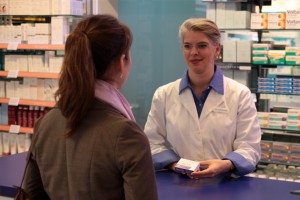Pharmacists play a vital role in providing emergency contraception to customers, where the vast majority of women choose to visit a pharmacy over their GP. Emergency contraceptive pills are available without a prescription directly from pharmacists in Ireland, making pharmacists key EC providers.1
The availability of emergency contraceptive pills from pharmacy without a prescription is critical to increase access and minimise delay of intake. This is especially significant given that emergency contraceptive pills are more effective the sooner they are taken after unprotected intercourse.
Women may also like the anonymity of the pharmacy as they can feel embarrassed about needing emergency contraception.3
- Pharmacists promote dialogue on contraceptive alternatives and influence the beliefs and the outcomes through effective counselling on EHCs. The supply of emergency contraception from pharmacies can be accompanied by patient education from pharmacists, who have expertise on this topic4
- Pharmacists provide information to patients at the time of EHC supply, which allows women to understand proper use of this medicine. Pharmacists ensure consistency of information about EHCs, in particular for women less than 17 years of age4
Pharmacy access to EHCs has not led to any negative consequences
When EHC is available through pharmacies without a prescription, the use of the medication increases compared to when it is available from doctors, clinics or hospitals.4 Increased access to EC through pharmacies does not have a negative impact on the use of other forms of contraception.4
Studies show that women and adolescents with greater access to EC are more likely to adopt an ongoing contraceptive method after EC use.9 Notably, it has been shown that greater level of use through non-prescription availability:
- Does not lead to increased rates of STIs5
- Does not increase sexual risk-taking behaviour in adolescents6,7
- Does not lead to increased frequency of unprotected sex5
- Does not lead to decreased use of other contraceptive methods5
- Does not lead to decreased use of contraception, including the most common methods such as contraceptive pills and condoms5,8
Women’s EC experience is actually a motivating factor leading to more consistent use of regular contraception9
Good Pharmacy Practice can include:
- Asking the right questions; avoiding unnecessary, personal or intrusive questioning
- Providing quality advice in a sensitive way, without lecturing
- Providing an environment where women feel comfortable and not judged, for example in the consultation room.
The quality of the pharmacy interaction is an important determinant of appropriate use of the product. It is also likely to be an important factor in a woman’s decision to take action in the event of a future UPSI.






